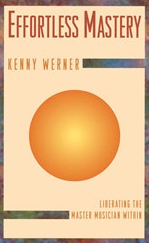
In January 2018, I had the privilege of participating in an Effortless Mastery workshop taught by jazz pianist and author Kenny Werner. After spending time with the Effortless Mastery book, I wanted to experience learning from Kenny in person. In this post, I recount some of the key points from the class and then share how those ideas have impacted my musicianship.
RECOLLECTIONS
Mastery Defined
Werner’s conception of mastery centers on ease and effortlessness in the execution of a given skill. In fact, the Effortless Mastery (henceforth “E.M.”) perspective goes so far as to place greater value on openness and freedom than being good or correct. The E.M. process involves affirming to oneself, “I am a master.” The purpose of this affirmation is to establish the mindset that through right efforts, one can develop skill.
Disorders and Delusions
Many musicians grapple with problematic mindsets that take hold over the course of training. Kenny, who has an incredible sense of humor, has coined two terms that likely resonate with anyone who has studied music at the university level—Music School Disease (M.S.D.) and Chronic Critique Syndrome (C.C.S.). He has also identified two primary delusions about music—1) music is important, and 2) music defines you.
Years of seeking the approval of teachers, rushing to learn pieces in order to meet short deadlines, and feeling left out from the attention given to more skilled players take their toll. Musicians can lose complete sight of the things they do well, endlessly gloss over weaknesses in their technique, or feel they are less valuable as human beings since they are not the most skilled. Rigidity and tension emerge from an overwhelming desire to be right. Eventually, players forget why they connected with music in the first place.
Practicing Defined
One fundamental component of achieving growth via E.M. is redefining one’s relationship with practicing. Although most people understand that the purpose of practice is to build skill, Werner astutely noted that practicing is often an exercise in assuring ourselves we are capable musicians. In my own experience, I can recall many instances in which I chose to accept “pretty good,” rather than humbly engage with difficulties that would, in time, enable me to play the same material really great.
Werner clarified that true practicing is the honest evaluation of one’s proficiencies and weaknesses. The musician must be willing to let mistakes occur and also be willing to let herself devote the necessary efforts to overcome those issues. He made no attempt to sell practicing as some sort of glamorous endeavor. Instead, he likened it to mundane activities such as data entry. Inputting data carefully and accurately offers the prospect of easily accessible information that one can rely upon with confidence at a later time. Quality practice affords the musician the same.
The Space
A second fundamental component of E.M. is the concept of “the space.” Working with the space is akin to meditation. Werner described the space as “a place that is untainted by this world.” In the space, we can detach from our thoughts; a sense of wonder for any and all sounds becomes available to us.
Going into the space is relatively easy. One must simply direct her attention to her breathing. There is no need to change one’s normal breathing pattern. Merely notice it. This process removes one from thought, care, and worry. One can choose to play after going into the space, or one can choose not to play. Both practices are important. When the plan is to play afterward, the musician should take the additional step of stopping and removing the hands from the instrument once she notices herself thinking.
Music Playing Itself
Getting real about practicing and working with the space concept help open the musician up to the possibility of music playing itself. Quality work is put in. One achieves acquaintance with a place of inner stillness and detached observation. The table is set for the body to move and the music to sound. The player is able to let the music happen rather than make the music happen. From here, the musician is freed up to listen and connect with her sound and feelings. When the player is so connected, the listener can connect.
Furthermore, by giving oneself permission to let mistakes occur in the practice room and then doing the deep work needed to establish technical ease and efficiency, one forges a true relationship with the instrument. Movements become natural, not stiffly compliant to some outwardly-imposed set of expectations. Such a musician has the possibility of not merely knowing the instrument, but being the instrument itself.
REFLECTIONS AND REVELATIONS
Since the workshop, I have continued to reflect fondly on all I learned. I have also come to notice various positive changes in my relationship with playing. For one, the amount of anxiety I experience in the days leading up to a performance and on concert day itself has significantly reduced. I suspect this change results from feeling more confident about the work I do in advance, which involves embracing the possibility of failures and patiently chipping away at fundamental deficiencies, even when doing so means not being able to tackle as much material in a given practice session. Going into performances, I feel certain that I put in my very best efforts during my preparations. In all my years as a musician, I have never experienced such a strong degree of this sort of assurance and satisfaction.
Another change I have observed is that when performing, I am increasingly focused on sound and the possibilities for developing it. While I am playing my first few notes of a show, the moment I notice thoughts of worry or concern, I consciously choose to direct my attention to enjoying my sound resonating within the room. Often, after I make this switch-to-sound choice, my awareness remains pretty steadily on the music for the remainder of the performance. I attribute this development to working with the space concept, or more specifically, detaching from thoughts and letting myself appreciate whatever sounds come from my instrument. I should add that learning to be in this state of appreciation has also alleviated anxiety as it is certainly a more empowering mindset than fearing potential problems or being dissatisfied by the current state of affairs. The prospect of adding more to something already of value is, not surprisingly, more uplifting than being in damage-control mode.
Thirdly, I feel much more physically free during and after playing than I have in the past. Wholeheartedly addressing weaknesses in my technique, in particular, a tendency to use excessive tension, has been a tremendous aid in this regard. I have devoted a significant amount of practice to learning to use only the necessary efforts to execute tasks.
Being comfortable with being wrong, even in the presence of others, has likely assisted in the area of physical freedom as well. Perhaps my favorite quote from the workshop is, “It’s not about not wanting to be good. It’s about not needing to be good.” This piece of wisdom from Kenny has become a mantra of sorts for me. Through Effortless Mastery, my relationship with music has become a happy adventure taken one small step at a time. Maybe a step will lead to improvement. Maybe it will not. Whatever the case, all along the way I will be connected with myself and what is most important to me.
